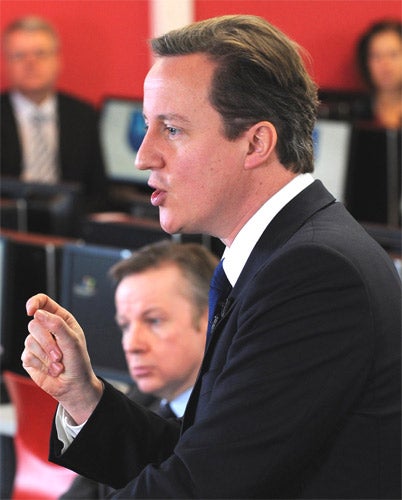Tories' Swedish schools plan 'will not work'
Conservative education reforms may leave budget black hole, say academics

Your support helps us to tell the story
From reproductive rights to climate change to Big Tech, The Independent is on the ground when the story is developing. Whether it's investigating the financials of Elon Musk's pro-Trump PAC or producing our latest documentary, 'The A Word', which shines a light on the American women fighting for reproductive rights, we know how important it is to parse out the facts from the messaging.
At such a critical moment in US history, we need reporters on the ground. Your donation allows us to keep sending journalists to speak to both sides of the story.
The Independent is trusted by Americans across the entire political spectrum. And unlike many other quality news outlets, we choose not to lock Americans out of our reporting and analysis with paywalls. We believe quality journalism should be available to everyone, paid for by those who can afford it.
Your support makes all the difference.Radical plans by the Conservative party to allow parent groups, charities and trusts to set up and run their own schools have come under renewed criticism today after academics warned the flagship scheme would not improve the quality of education in Britain and may leave a budget black hole.
The so-called "Swedish model", adopted by the Tories as their key education policy, has been championed by the shadow Schools Secretary, Michael Gove, as a way of driving up standards by giving parents more choice. But an article by the Centre for Economic Performance (CEP) published today states that the reforms would "not make very much difference" as competition already exists within the current British system.
Under the scheme, any approved group would be able to run an independent, non-fee-paying school funded by the state. But the CEP argued that unlike in Sweden, where parents were given little freedom to choose between schools until the new system was introduced in the early 1990s, British schools already have to compete. "Importing the Swedish model may not make very much difference to the UK's educational status quo," it states.
"Sweden started from a position of no school choice: all pupils had to attend the state school in their neighbourhood. In the UK, however, there is already much school choice and a diversity of provision. The problem is that not all people in the UK are empowered to exercise choice because they do not have the money to move to an area with popular schools or the personal resources to access and understand information about school quality."
The article, by Helena Holmlund, from the Swedish Institute for Social Research at Stockholm University, and Sandra McNally, a director at the CEP, also raised doubts over the Tories' claims that major spending would not be needed. They said the costs of gradually closing old schools and switching to new ones needed "to be factored into the expected cost-effectiveness of a 'school creation' policy". Ms McNally said of the Swedish scheme: "You can't say it's been an amazing success and that therefore we should be doing the same thing here because that's not true."
The warning emerges just a week after the head of Sweden's school inspectors said that the introduction of the independently run schools had not produced better results in their country. It will come as uncomfortable reading for the Tories, as it is the latest in a series of headline policies to be criticised. David Cameron admitted last month to being confused over his party's commitments on supporting marriage through the tax system. He also appeared to backtrack on plans to make major cuts in Britain's budget deficit this year.
Teachers and heads also questioned the party's determination to introduce the Swedish model. "Independent evidence from Sweden has indicated that this doesn't raise standards," said John Dunford, general secretary of the Association of School and College Leaders. "It will also be very expensive at a time when public spending will be tight."
John Bangs, head of education at the National Union of Teachers (NUT), said it posed a "classic risk" of creating a two-tier system of education. "There is evidence in Sweden that the independent schools have become dominated by the middle classes," he said.
However, Nick Gibb, shadow minister for schools, dismissed the research as flawed. "It ignores the most respected academic evidence which shows without doubt that allowing new schools to start up, as occurred in Sweden and parts of America, improves standards," he said. "Parents want more smaller schools with smaller classes and that's what they will get if we win the election."
Join our commenting forum
Join thought-provoking conversations, follow other Independent readers and see their replies
Comments